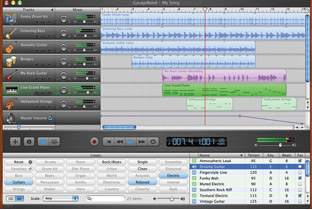Published
Tue, Mar 8, 2011, 13:00
- This week the column asks if an understanding of music theory is necessary to create good music.

Last week, like millions of other people, I watched with interest as Apple unveiled version 2 of the iPad. I found myself on Apple's website watching the characteristically slick video they'd put together explaining its capabilities and was excited to see that for the first time a native Apple music making app will be available: GarageBand.
However, what particularly struck me as I was watching short demonstrations of virtual pianos being triggered, guitars strummed and drums struck was Scott Forstall's voiceover which said GarageBand on the iPad is so much fun that "you don't need to be a musician to use it." This sentence stayed with me and is the hook line to this week's column, as it poses so many questions, the first of which is simple: does it matter that we're embracing music technology which, through its own marketing, claims that musicianship isn't a requirement?
I've wanted to be a musician all my life and, growing up in a world where technology for music creation was prohibitively expensive (though being involved in "studio music" was always my long-term dream), I gladly embraced the other opportunities music provided, taking violin and piano lessons, learning music in school and playing in an orchestra and bands before deciding to continue my musical studies at university. As a professional, I teach electronic music in a London music conservatoire surrounded by musicians who take the technical performance aspects of their own music-making to yet another level, so it's perhaps no surprise that the concept that software to facilitate music making without actually engaging in traditional music practice seems worthy of note to me.
You might be expecting me to follow up by saying that I think such a concept is wrong but I don't actually sit on one side of this debate, as I can see that as a conceit, there are major advantages to what I imagine the GarageBand app will be able to do. For starters, it'll definitely provide an intuitive interface through which music can be made, leaving the user plenty of opportunity to express him or herself musically. For a very low price, it'll also engage people in multi-track recording and should encourage collaboration, which I consider essential in the development of musicians. In the hands of the younger generation, I imagine there'll be some virtual players for whom GarageBand represents a springboard to picking up "the real thing" and while some might be put off by the fact that this will represent a serious technical challenge, there'll be others who'll delight in a more organic relationship with the instruments they go on to play.
This debate isn't new. At the time that digital samplers became available, the world watched on, dumb-struck and horrified that producers with no musical skill could grab stretches of audio from other people's work and re-cast them as their own. But fast forward 20 years and most people now accept that creative sampling is a cornerstone of our industry. Technology and music have always enjoyed a symbiotic relationship—one facilitates the other and vice versa.
That said, I also wholeheartedly believe that, whether consciously or unconsciously, we all want to get better as musicians. I've worked with dozens of singers, in particular, who have shown no interest in formally learning to read music and who seem affronted by the idea that it might be a benefit to them, yet positively come alive when ad lib'ing harmonies or singing snatches of a song which has inspired them, all of which requires critical musical faculty. Some guitarists take personal offense when a chord is suggested which is unknown or seems too fiddly, who'll then marvel at Hendrix solos and his extraordinary technique and versatility alongside that of other axe-wielding heroes. There's more to music development than sitting exams or taking grades and so our developing musical ability sometimes creeps up on us, joyfully and unexpectedly.
The point is that, no matter how you engage with music-making and no matter how unscientifically musical your starting point is, the desire to get better at making records is there burning away in all of us, whether we choose to address this by working harder at a mix which doesn't seem quite right, or by practicing an instrument for eight hours a day.
So, for me personally, I'd rather Apple's voiceover said something along the lines of "GarageBand for iPad is so fun you need no musical skill to start using it. But pretty soon you'll be making music you'll really love." Perhaps not as punchy but, for me, more inspiring.